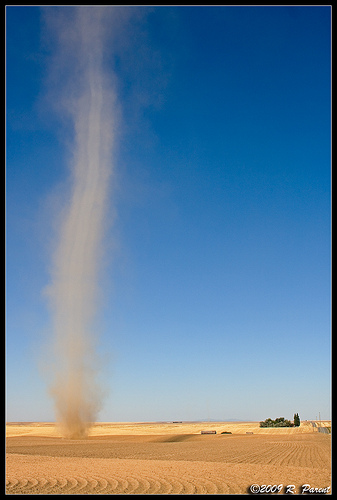FWP:
SETS == DOUBLE ACTIVATION; WORDPLAY
The assertions here are so simple, flat, and multivalent that they can be connected in various ways. For gard-baad can mean either a whirlwind or a demon, and nothing in the verse enables us to rule out either meaning. If the speaker is a whirlwind, then his characteristic quality/disposition is the 'cold-boisterous-wind of ardor'; and if he's a demon, then his voice is the sound of the 'cold-boisterous-wind of ardor'. Intriguingly, in English idiom we have the whirling funnel-shaped 'dust-devil', which seems to conflate the two possibilities.
And what is a whirlwind or demon 'of' the road of restlessness? Given the multivalence of the i.zaafat , here the 'of' can mean 'generated by', or 'living in', or 'equivalent to', or merely 'associated with'. Since all those possibilities are crammed into an extremely short and simple verse, we have no means of resolving them.
Then in the final 'punch-word' position we have baanii , which has two separate Indic-side meanings (see the definitions above) that are-- as usual, for Ghalib-- both excellently appropriate in this context. (The Arabic one related to 'builder' can't work because it's masculine.) For more examples of such 'double activation', see {120,3}.
The verse has a lingering, chilly after-effect
of mood. Its resonance
is not due to any precise meaning, but rather to its starkness, its evocative
imagery, and its very ambiguity.

Nazm:
I am restless like a whirlwind [baguulaa], and am a gard-baad of the roadway of restlessness; and the quality [baanii] of that skill/craft [hatka;N;Daa] is the 'cold-boisterous-wind of ardor'. (205)
== Nazm page 205